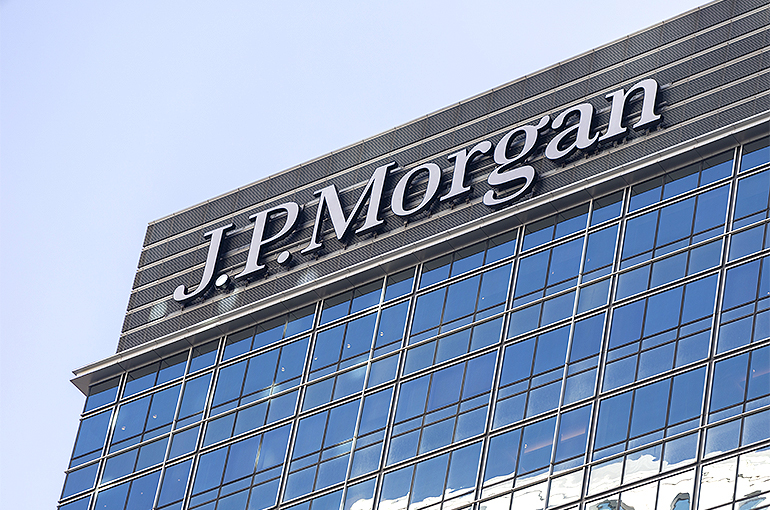 J.P. Morgan Eyes Opportunity in Rapid Global Expansion by Chinese Firms, New China Chiefs Say
J.P. Morgan Eyes Opportunity in Rapid Global Expansion by Chinese Firms, New China Chiefs Say(Yicai) May 30 -- Chinese businesses are expanding overseas at an accelerating pace, spawning greater opportunities for J.P. Morgan, one of the largest US financial firms operating in the country, according to its new China co-senior country officers.
Chinese firms have been going global in recent years, with Vietnam, Singapore, the Middle East, Europe, and the United States their most popular destinations, said Alan Ho, who was named with Rita Chan to their new position last month.
Many businesses in e-commerce, electric vehicles, solar power, and consumer goods have gone overseas successfully, he said in an interview with Yicai during J.P. Morgan's Global China Summit, which ran from May 23 to 24.
With the boom in the US and Japanese stock markets and the rising demand for global asset allocation, Chinese investors have also become more interested in overseas opportunities, Ho pointed out.
In this context, compared to competing with local peers in China, international investment banks seem to have found a path to differentiated competition, Chan told Yicai.
“Serving multinational corporations and assisting companies in expanding their international business is one of our core competitive advantages,” she said, adding that the go-global trend among Chinese businesses provides a huge opportunity for foreign financial institutions.
“These firms will face challenges when going overseas, including fluctuations in interest rates and exchange rates, cultural differences, and they also need to seek M&A opportunities and local strategic partners,” Chan noted. “J.P. Morgan has a presence in many countries and regions and can provide a complete set of solutions.”
Foreign banks have natural advantages in doing business overseas, but face fierce competition in China. Net profit at J.P. Morgan Securities (China) Limited Company (JPMSC) halved to CNY119 million (USD16.4 million) last year from CNY263 million the year before on operating revenue of CNY758 million.
Opened for business in 2020, JPMSC began to profit from its securities business in its second year of operation and has remained profitable for three consecutive years, Chan noted. That is not easy for such a newly established company and reflects the added value of foreign capital to China's capital market, she noted.
Despite a slowdown in initial public offerings in China and abroad, the operating revenue and business scale of J.P. Morgan's Chinese corporate banking business continues to rise, including its payments and foreign exchange/interest rate businesses.
More Regulation of Listed Firms
China will likely introduce more policies to enhance the quality of listed firms this year, so mergers and acquisitions will become more important, according to the co-senior country officers.
In the middle of last month, China’s cabinet introduced several capital market policies, with the aim of enhancing the overall quality of listed companies. The policies focus on promoting higher dividend yields, tightening the criteria for company listings, and improving the delisting system.
The amount raised in Chinese mainland IPOs fell 65 percent to CNY23.6 billion (USD3.26 billion) in the first quarter of the year quarter from a year ago, the trend towards improving the quality of newly listed businesses and tightening listing requirements is expected to continue.
The impact of China’s new regulation of the capital market and risk prevention is positive, Chan noted. Establishing a fair market environment that protects investors' rights and improving listing and delisting mechanisms are necessary steps, she said.
As the market continues to mature, the importance of M&As will also go on increasing, and investment banking services will not be limited to IPOs, Chan added.
Key to Economic Recovery
China is implementing strong stimulus measures for the real estate market and the economy, with foreign capital flowing back into the Chinese mainland and offshore stock markets. The Hong Kong Hang Seng Index has climbed nearly 25 percent recently.
It can be observed that Hedge funds have bought into the Hong Kong market, and there has been no significant profit-taking after the Hang Seng rebounded, indicating that funds are willing to stay put, Ho noted.
But the portfolios of long-term funds have been underweight Chinese stocks in the past two years due to the weak liquidity and high interest rates of Hong Kong stocks and the more impressive performance of their European, US, and Japanese counterparts, he added.
Long-term overseas funds such as university endowment programs and sovereign wealth funds still have a wait-and-see approach, but if the economic recovery can be sustained, they may gradually increase their allocations to Chinese stocks, Ho pointed out.
Whether China's property market will stabilize is crucial to the country's economy, according to J.P. Morgan’s research team. Last month's economic data was weaker than expected, but the figures will likely improve over the next few months following recent policy changes, with the economy set to grow by 5.2 percent this year, the team predicted.
Editor: Martin Kadiev